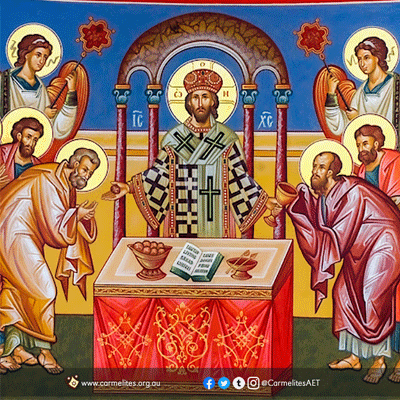 On the first day of Unleavened Bread, when the Passover lamb was sacrificed, his disciples said to Jesus, ‘Where do you want us to go and make the preparation for you to eat the Passover?’ So he sent two of his disciples, saying to them, ‘Go into the city and you will meet a man carrying a pitcher of water. Follow him, and say to the owner of the house which he enters, ‘The Master says: Where is my dining room in which I can eat the Passover with my disciples?’ He will show you a large upper room furnished with couches, all prepared. Make the preparations for us there.’ The disciples set out and went to the city and found everything as he had told them, and prepared for the Passover.
On the first day of Unleavened Bread, when the Passover lamb was sacrificed, his disciples said to Jesus, ‘Where do you want us to go and make the preparation for you to eat the Passover?’ So he sent two of his disciples, saying to them, ‘Go into the city and you will meet a man carrying a pitcher of water. Follow him, and say to the owner of the house which he enters, ‘The Master says: Where is my dining room in which I can eat the Passover with my disciples?’ He will show you a large upper room furnished with couches, all prepared. Make the preparations for us there.’ The disciples set out and went to the city and found everything as he had told them, and prepared for the Passover.
And as they were eating he took some bread, and when he had said the blessing he broke it and gave it to them. ‘Take it’, he said, ‘this is my body.’ Then he took a cup, and when he had returned thanks he gave it to them, and all drank from it, and he said to them, ‘This is my blood, the blood of the covenant, which is to be poured out for many. I tell you solemnly, I shall not drink any more wine until the day I drink the new wine in the Kingdom of God.’
After the psalms had been sung they left for the Mount of Olives.
(Mark 14:12-16, 22-26)
It seems a bit odd to be celebrating the Feast of the Body and Blood of Christ at a time when so many in both Melbourne and throughout the world cannot attend Mass and receive the Eucharist. Yet I think that this time has actually been a blessing for us. The pandemic has helped us find new ways of being present to others and new ways of being the real presence of Christ.
When what we have been used to suddenly changes, it is challenging. It is hard to deal with the sense of loss. But if we can transcend the moment it can become an opportunity. I’m thinking of the many people, faced with new situations over the past few months, who saw new opportunities. Wine-makers producing hand sanitiser. Restaurants and cooking schools producing meals for vulnerable people. Clothing manufacturers making face masks. They didn’t try to do what they had always done. They did something new, practical and useful with what they had.
That’s what we have been doing too. We have been allowing ourselves to feast on the words of the Gospel, to explore the mystery of God’s action within our hearts and our call to be God’s love in the world. We are very used to thinking about the Real Presence of Jesus being in the Blessed Sacrament. But the real presence of Christ is also in the community when it gathers in his name to feast on the Word of Scripture, to recall what Jesus said and did at the Last Supper (not only the words over bread and wine, but also the washing of the feet), when it shares the food of the Eucharist together, when it goes out and continues to break and pour out that food in acts of loving kindness, in soothing and nourishing words which brings others to life.
The Eucharist is not an object to be looked at, but an action to be done so that the living presence of Jesus continues to touch and heal.
Maybe we need to think more deeply about the real presence of Jesus being in real, living human beings. Bread and Wine have no eyes to gaze with love, no face with which to smile, no mouth to speak soothing words, no arms to hold the grieving and the sick, or to lend a hand, no ears to hear the pain. But we do.
So we are called to become the Eucharist that feeds those around us with the nourishment of breadth of heart and vision, respect, love, compassion, hope and forgiveness.
May we become what we receive. (St Augustine)
Download our Celebrating At Home liturgy for this Sunday here.
Celebrating At Home Body and Blood of Christ [PDF]
Celebrating At Home Body and Blood of Christ [ePub]














